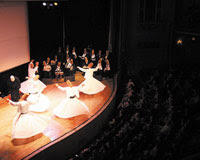 By Sezai Kalayci - Today's Zaman - Istanbul, Turkey
By Sezai Kalayci - Today's Zaman - Istanbul, TurkeyMonday, June 25, 2007
Mevlana’s loving tolerance captivates NY once again
The loving tolerance of the great Turkish Sufi philosopher and poet Mevlana Rumi has enveloped New York once again.
The Istanbul Historical Turkish Music Ensemble, whose efforts have made possible the bringing of a major part of the religious repertory of an eighth century heritage into the present day without losing its original spiritual flavor, held a Mevlevi rite in Manhattan on Saturday as part of events organized for the Year of Mevlana, declared by UNESCO in celebration of the philosopher.
The Mevlevi rite was received with a great enthusiasm by an audience made up of Muslims and non-Muslims alike.
Addressing an audience of over 1,000 people in Town Hall on Saturday night, Professor Ahmet Arı spoke prior to the whirling ceremony and remarked that the world was urgently in need of such a language of peace.
Arı placed a particular emphasis on the fact that Sufism was the mystical core of Islam and was certainly not something separate, noting that the Koran contained the seeds of Sufism and that Mevlana Rumi was a very pious Muslim, unlike what is claimed to the contrary.
Turkey’s Consul General in New York Mehmet Samsar also made a speech, saying, “It’s possible to understand real love and learn how to respect one another only through lending the ears of our hearts to the source of his [Mevlana’s] blessed voice.”
Helene-Marie Gosselin, who attended the affair on behalf of UNESCO, said, “As UNESCO, we are proud of accompanying the celebrations of Mevlana Rumi’s 800th birthday.” She also said she believed it was possible to realize the project of the “Alliance of Civilizations” only through the teachings of Mevlana, ending her speech with his world-famous lines:
“Be like a river in generosity and helping others
Be like the sun in compassion and remorse
Be like the night in covering the faults of others
Be like a dead person in anger and hatred
Be like the black earth in humility and modesty
Be like an ocean in loving tolerance
Either appear as you are or be as you appear…”
Mevlana’s loving tolerance captivates NY once again
The loving tolerance of the great Turkish Sufi philosopher and poet Mevlana Rumi has enveloped New York once again.
The Istanbul Historical Turkish Music Ensemble, whose efforts have made possible the bringing of a major part of the religious repertory of an eighth century heritage into the present day without losing its original spiritual flavor, held a Mevlevi rite in Manhattan on Saturday as part of events organized for the Year of Mevlana, declared by UNESCO in celebration of the philosopher.
The Mevlevi rite was received with a great enthusiasm by an audience made up of Muslims and non-Muslims alike.
Addressing an audience of over 1,000 people in Town Hall on Saturday night, Professor Ahmet Arı spoke prior to the whirling ceremony and remarked that the world was urgently in need of such a language of peace.
Arı placed a particular emphasis on the fact that Sufism was the mystical core of Islam and was certainly not something separate, noting that the Koran contained the seeds of Sufism and that Mevlana Rumi was a very pious Muslim, unlike what is claimed to the contrary.
Turkey’s Consul General in New York Mehmet Samsar also made a speech, saying, “It’s possible to understand real love and learn how to respect one another only through lending the ears of our hearts to the source of his [Mevlana’s] blessed voice.”
Helene-Marie Gosselin, who attended the affair on behalf of UNESCO, said, “As UNESCO, we are proud of accompanying the celebrations of Mevlana Rumi’s 800th birthday.” She also said she believed it was possible to realize the project of the “Alliance of Civilizations” only through the teachings of Mevlana, ending her speech with his world-famous lines:
“Be like a river in generosity and helping others
Be like the sun in compassion and remorse
Be like the night in covering the faults of others
Be like a dead person in anger and hatred
Be like the black earth in humility and modesty
Be like an ocean in loving tolerance
Either appear as you are or be as you appear…”




No comments:
Post a Comment